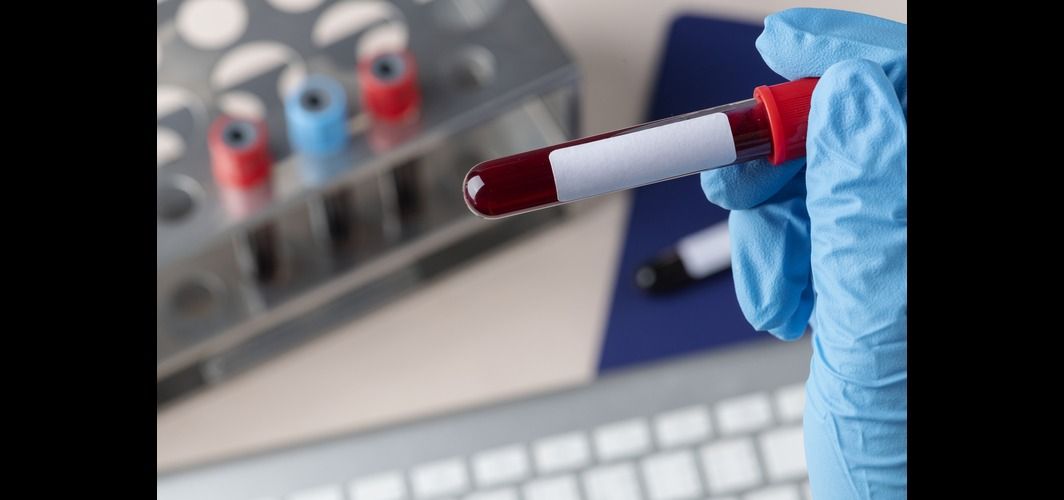General Health
Globulin Test – Normal Range, Purpose, Procedure and Results Interpretation
5 min read
By Apollo 24|7, Published on - 13 May 2025
Share this article
0
0 like
.jpg?tr=q-80)
The serum globulin test, also known as globulin electrophoresis, is a vital diagnostic tool used to measure the levels of globulins in the blood. Globulins are a group of proteins that play essential roles in liver function, immune system activity, and blood clotting. These proteins are primarily produced by the liver and the immune system, and their levels can provide valuable insight into your overall health. In this article, we will explore the purpose of the serum globulin test, the procedure involved, preparation guidelines, interpretation of results, the serum globulin normal range (including the globulin normal range for female and male patients), and what to do if your results are outside the expected values.
What is Globulin?
Globulin is a group of proteins found in your blood plasma that play a crucial role in many vital body functions. Unlike albumin, another major blood protein responsible for maintaining fluid balance, globulins are mainly involved in:
- Immune system defence (e.g., antibodies or immunoglobulins)
- Blood clotting
- Transporting substances like hormones, fats, and minerals
- Fighting infections and inflammation
Globulins are produced by the liver and the immune system. They are typically divided into four categories:
- Alpha-1 globulins: help carry hormones and enzymes
- .Alpha-2 globulins: include haptoglobin and other transport proteins.
- Beta globulins: involved in iron transport and immune functions.
- Gamma globulins: primarily immunoglobulins (antibodies), which defend against pathogens.
Purpose of the Globulin Test
The serum globulin test is commonly performed as part of a broader liver function or protein panel. It helps to evaluate:
- Liver Function: Globulins are synthesised in the liver; abnormalities can suggest liver damage or disease.
- Immune Health: Globulins include immunoglobulins (antibodies), which are vital for fighting infections.
- Protein Balance: The test aids in assessing the overall protein balance in the body, alongside albumin.
- Inflammatory and Autoimmune Conditions: Elevated globulin levels may point to chronic inflammation or autoimmune disorders.
- Nutritional Status: Abnormalities can indicate malnutrition or other metabolic issues.
Preparation for a Globulin Test
Preparation for the serum globulin test is usually simple:
- Fasting: Not always necessary, but your doctor may ask you to fast for 8–12 hours if the test is part of a liver or metabolic panel.
- Medications: Inform your doctor about all medications and supplements you're taking, as certain drugs (e.g., corticosteroids, androgens) can affect globulin levels.
- Hydration: Ensure you're adequately hydrated, as dehydration may influence protein concentration in the blood.
- Diet: No specific dietary restrictions are required, but avoid high-protein meals immediately before the test if advised.
Procedure for the Globulin Test
The test is quick and minimally invasive:
- Blood Sample Collection: A healthcare professional will clean the puncture site, usually in your arm, and draw a blood sample using a sterile needle.
- Laboratory Analysis: The blood is analysed in a lab, where the total protein and albumin levels are measured. The globulin level is typically calculated by subtracting albumin from the total protein.
- Post-Test: You may experience mild discomfort or bruising at the puncture site, which typically resolves quickly.
Globulin Normal Range
Understanding the serum globulin normal range is key to interpreting your test results. While ranges can vary slightly between laboratories, standard values are typically as follows:
The globulin normal range female is generally slightly narrower than that of males, due to physiological and hormonal differences.The globulin normal range male may be marginally higher, often associated with greater muscle mass and metabolic activity.
Your doctor will evaluate your globulin levels in conjunction with other tests (e.g., albumin/globulin ratio) to provide a more comprehensive view.
Interpreting Globulin Test Results
Your globulin test results will be assessed in the context of your total protein levels, albumin, and any clinical symptoms you may have. Interpretation involves the following:
1. Elevated Globulin Levels
High serum globulin levels may indicate:
- Chronic infections (e.g., tuberculosis, hepatitis)
- Autoimmune diseases (e.g., lupus, rheumatoid arthritis)
- Liver disease (e.g., cirrhosis, hepatitis)
- Multiple myeloma or other plasma cell disorders
- Inflammatory conditions
- Certain cancers
2. Low Globulin Levels
Reduced globulin levels can be associated with:
- Kidney disease (e.g., nephrotic syndrome)
- Liver dysfunction or failure
- Malabsorption syndromes (e.g., coeliac disease)
- Immune deficiency disorders
- Severe malnutrition
- Acute haemolysis
Since globulin is a broad category, further investigations such as serum protein electrophoresis may be required to determine which globulin fraction is affected.
3. Albumin/Globulin (A/G) Ratio
The A/G ratio is another valuable marker. It compares the levels of albumin to globulin and is normally greater than 1.0. An abnormal ratio could point towards:
- Low ratio (A/G < 1): May suggest overproduction of globulins (e.g., multiple myeloma) or underproduction of albumin (e.g., liver disease).
- High ratio (A/G > 2): Can occur in cases of underproduction of globulins or excessive albumin production.
Always interpret the results under medical supervision, especially if your values are significantly outside the serum globulin normal range.
Factors Affecting Globulin Levels
Numerous factors can influence your serum globulin levels:
- Chronic illnesses or infections: Elevates globulin levels due to ongoing immune response.
- Medications Use: Medication like steroids or hormones may alter globulin production in the liver.
- Nutritional status: Poor nutrition can lead to decreased globulin synthesis.
- Immune system health: Weakened immune system affects the production of globulins, especially immunoglobulins.
- Liver and kidney function: Liver or kidney dysfunction can disrupt globulin balance in the bloodstream.
Managing Abnormal Globulin Levels
If your globulin levels are abnormal, your doctor will guide the next steps based on the underlying cause. Below are the ways to manage abnormal globulin levels:
1. High Globulin Level Management
- Treatment of underlying disease: Autoimmune diseases, infections, or cancer must be addressed directly.
- Anti-inflammatory or immunosuppressive therapy: In autoimmune disorders.
- Lifestyle adjustments: For liver-related issues, including limiting alcohol and following a liver-friendly diet.
2. Low Globulin Level Management
- Nutritional interventions: Improve protein intake if due to malnutrition.
- Treating malabsorption: Conditions like coeliac disease may require a gluten-free diet.
- Supplementation: Immunoglobulin therapy may be indicated in immunodeficiency.
- Monitoring: Regular follow-up to assess changes over time.
Conclusion
The serum globulin test is a valuable diagnostic measure that helps assess liver health, immune function, and overall protein status. It plays a crucial role in detecting chronic infections, inflammatory conditions, autoimmune diseases, and protein metabolism disorders. Understanding the globulin normal range, including the globulin normal range female and globulin normal range male, is key to interpreting test results and initiating appropriate treatment where needed. When combined with other blood tests and clinical evaluations, serum globulin measurement can offer early detection of health concerns and guide interventions that improve long-term well-being. Regular check-ups and maintaining a healthy lifestyle can support balanced protein levels and contribute to better immune and liver health.
General Health
Frequently Asked Questions
Can high globulin levels be dangerous?
Can high globulin levels be dangerous?
What causes low serum globulin levels?
What causes low serum globulin levels?
Do I need to fast before the test?
Do I need to fast before the test?
How are globulin levels calculated?
How are globulin levels calculated?
Can abnormal globulin levels indicate serious health issues?
Can abnormal globulin levels indicate serious health issues?
How do I keep my globulin levels normal?
How do I keep my globulin levels normal?
Is a low A/G ratio the same as high globulin?
Is a low A/G ratio the same as high globulin?
What conditions are associated with abnormal globulin levels?
What conditions are associated with abnormal globulin levels?
How are serum globulin levels tested and is the procedure painful?
How are serum globulin levels tested and is the procedure painful?
Can lifestyle or diet influence my globulin levels?
Can lifestyle or diet influence my globulin levels?
Leave Comment
Recommended for you

General Health
Night Owls Or Early Birds: Who’s More Likely To Develop Heart Ailments & Diabetes?
Researchers conducted a study that compared night owls, those who stay up late, with the early birds, those who are at their most energetic in the mornings. Read to know how these sleeping habits can affect people’s susceptibility to developing certain chronic diseases.

General Health
Your Weight Can Influence Vitamin D Absorption In Your Body! Know How
Did you know your weight could affect the amount of vitamin D you can absorb? Find out how different body sizes influence vitamin D absorption and get tips on ensuring you get the most out of your intake.

General Health
Understanding Platelet (PLT) Normal Range and its Importance in Health
Learn about platelet normal range, causes of high and low counts, functions, diagnostic tests, and prevention tips.
Subscribe
Sign up for our free Health Library Daily Newsletter
Get doctor-approved health tips, news, and more.
Visual Stories

Could There Be More to Your Snore?
Tap to continue exploring
Recommended for you

General Health
Night Owls Or Early Birds: Who’s More Likely To Develop Heart Ailments & Diabetes?
Researchers conducted a study that compared night owls, those who stay up late, with the early birds, those who are at their most energetic in the mornings. Read to know how these sleeping habits can affect people’s susceptibility to developing certain chronic diseases.

General Health
Your Weight Can Influence Vitamin D Absorption In Your Body! Know How
Did you know your weight could affect the amount of vitamin D you can absorb? Find out how different body sizes influence vitamin D absorption and get tips on ensuring you get the most out of your intake.

General Health
Understanding Platelet (PLT) Normal Range and its Importance in Health
Learn about platelet normal range, causes of high and low counts, functions, diagnostic tests, and prevention tips.